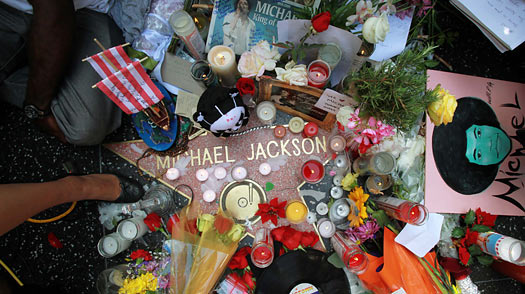
A sidewalk shrine of mementos, flowers, candles and notes adorn the star of Michael Jackson on the Hollywood Walk of Fame in Los Angeles.
Michael Jackson kept his most stunning performance for the very end. Always able to command an audience, he knew how to bring whole arenas to fits of exultation with his moves and then silence them to the point of tears with his poetry. He was brilliant, excessive, maudlin, tacky and possibly criminal, but you could never ignore him. So it was fitting that in death, he momentarily silenced the largest arena humanity has ever known, the Internet.
News of this middle-aged man's sudden passing nearly broke the Web. Google's news section malfunctioned under the weight of "Michael Jackson" searches. The volume of Jackson-related tweets reached 5,000 per minute the day he died; Twitter was so overwhelmed that some users couldn't get into their accounts. Wikipedia buckled temporarily after hundreds of edits were made to Jackson's page. Across the Internet, more than 24,000 Jackson collectibles were offered for auction or sale. Jackson was crowned the King of Pop back before new media helped crack the monolith of radio pop into innumerable subgenres, from hip-hop and house to praise rock and adult contemporary. But the old-media monarch showed, one last time, that he still reigned: the world stopped for him for a few hours on June 25.
Not just online. Huge crowds gathered in Hollywood, in Harlem, N.Y., and near the home where he grew up in Gary, Ind. Travelers passing through the Miami airport huddled close around its TVs. Street tributes went up from Paris to Karachi, from Moscow to Mexico City. A candlelight vigil was held in Beijing. In Japan the Defense Minister eulogized him.
The consummate performer, Jackson may well have suspected that his final exit would be a spectacle. The combination of sudden death and pop-cultural universality has triggered global mourning in the past: Elvis, Diana, John Kennedy Jr. Jackson fit the pattern, almost eerily. The day after he died, one of his ex-wives, Lisa Marie Presley, wrote on her blog that Jackson once looked at her intently and said, referring to her father, "I am afraid that I am going to end up like him, the way he did." Elvis, a heavy prescription-drug user, died in August 1977 after crawling a few feet away from a toilet he had been sitting on. The coroner's report listed as Elvis' cause of death coronary arrhythmia; Jackson was rushed to the hospital after suffering cardiac arrest.
In the theater of celebrity tragedy, each play has three acts. The first is confusion. Why did it take hours for someone to find Elvis? Why wasn't Diana wearing a seat belt in a speeding car? What was J.F.K. Jr. doing flying his own plane? For Jackson, the questions revolve around his health. If he was ill, why didn't anyone do something about his fragility? What we know is that someone at the Los Angeles mansion he was renting called 911 at 12:21 p.m. that day. "He's not breathing," the man said. "He's not responding to CPR, anything." He said a physician, identified in news reports as Dr. Conrad Murray, "has been the only one here." Murray seems to have tried hard to save Jackson — his voice is muffled but frantic in the background of the emergency call — but he kept to himself in the days after Jackson died. The police impounded the car Murray used — not because he is under suspicion, authorities said, but to check for medications that might have played a role in Jackson's death.